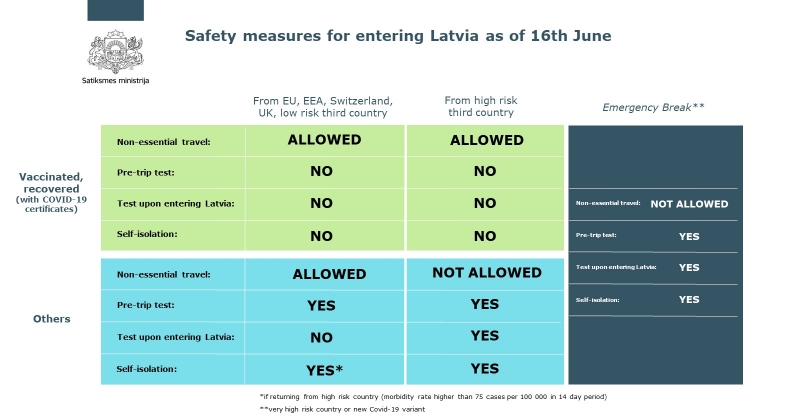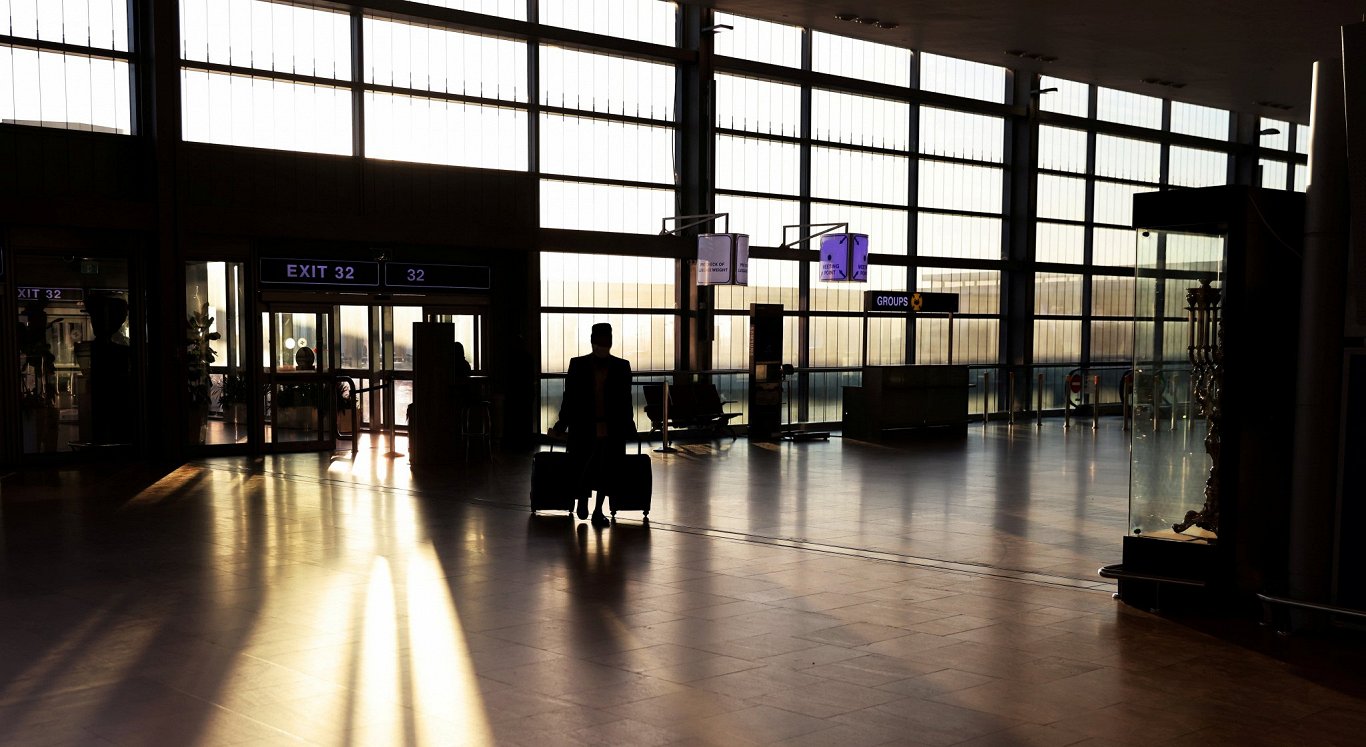It is decided to divide countries into three categories: low risk, high risk and particularly high risk or 'emergency brake' countries. A country with a cumulative incidence rate of up to 75 cases per 100 000 inhabitants over 14 days is considered to be low risk (until now the figure had been 50 cases).
Restrictions will still apply to people vaccinated against or having overcome Covid-19 if they travel from particularly high-risk countries, such as India. In other cases, vaccinated people and former Covid-19 patients will be able to travel without restrictions: there will be no testing before boarding the vehicle, no testing upon entry, and self-isolation requirements will be waived.
Changes to other self-isolation rules will also be introduced, which will allow self-isolation to be discontinued on the seventh day if a PCR test shows a negative result.

From Wednesday, June 16, the ban on non-essential travel, the requirement to pass a Covid-19 test and self-isolate when entering Latvia will be lifted if an individual can present a digital Covid-19 certificate confirming the completion of vaccination or recovery from the disease.
The amendments also stipulate that children under the age of 12 do not have to present a negative test result when entering Latvia, but they will be subject to the same conditions for self-isolation as their travelling companions: if the person accompanying the child does not have to self-isolate, then the child also does not have to. However, for 10 days after entry, those children will not be allowed to contact people outside their household, attend public events, children’s groups, go to camp, school, or kindergarten, or use public transport.
In future, for a country to be considered epidemiologically safe, its cumulative incidence over the last 14 days must not exceed 75 cases per 100 000 population, instead of the current 50 cases.
The ban on non-essential travel to Latvia, the requirement to perform a test before and after the trip, as well as the requirement for self-isolation for vaccinated and recovered remain only when traveling from countries with a particularly high risk to public health (Emergency brake regulation).
Non-Covid-19 certified (non-vaccinated, non-recovered, without negative test result) individuals are allowed non-essential travel from the EU, EEA, Switzerland, the United Kingdom, and low-risk third countries, but non-vaccinated people must be tested before travel and self-isolate upon arrival. When returning from high-risk third countries, those individuals must additionally undergo a test upon arrival in Latvia.
For vaccinated persons and persons who have had and overcome Covid-19:
- Non-essential travel to the EU, EEA countries, Switzerland, UK and low risk third countries will be allowed. A Covid test before the flight and when entering Latvia will no longer have to be carried out, nor will it be necessary to comply with self-isolation.
- Non-essential travel to high-risk third countries will be allowed. Tests will not have to be performed before the trip or when entering Latvia. Self-isolation will not have to be observed either.
- Non-essential travel to countries with a particularly high risk to public health will not be allowed. In the case of travel for essential purposes, a test will have to be carried out before the trip and when entering Latvia. Self-isolation will also have to be respected.
For those who have not been vaccinated against Covid-19 or overcome it:
- Non-essential travel to the EU, EEA countries, Switzerland, Britain and low-risk third countries will be allowed. A test will not have to be carried out before the trip but will be necessary upon returning to Latvia. Self-isolation will have to be observed if returning from a country with a morbidity rate of higher than 75.
- Non-essential travel to high-risk third countries will not be allowed. A test will have to be carried out before the trip and when entering Latvia. Self-isolation will have to be observed.
- Non-essential travel to countries with a particularly high risk to public health will not be allowed.
The safety measures for unvaccinated people still apply since there is not a high enough proportion of vaccinated people in the country, according to the amendments.
The EU member states have agreed on the so-called 'emergency brake' regulation which stipulates that if a country has a sudden outbreak of Covid-19, the previous restrictions prohibiting non-essential travel can quickly be put back in force in regard to that country.
The amendments enter into force June 16.
Travellers should also check the requirements of their destination countries, as these may differ from Latvia's requirements.
“I am pleased that travel requirements have been simplified and aligned with the recommendations of the Council of the European Union. Latvia’s decision to allow non-essential travel for the vaccinated has been harmonized with the regulations of other EU Member States. The epidemiological situation in the European Union is improving, and this allows us to review the restrictions imposed so far. Coordinated and united action of the European Union for free travel will allow both citizens to plan summer vacations and the international passenger transport industry to return to business as usual,” said Transport Minister Talis Linkaits (New Conservative Party).
More details of the changes are available at the Ministry of Transport website.






























